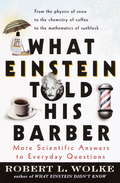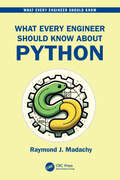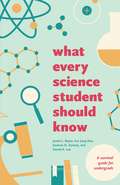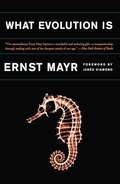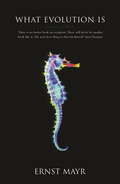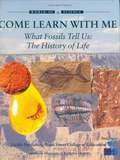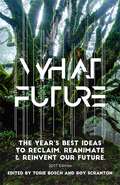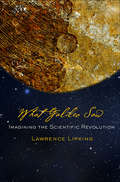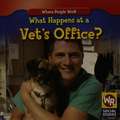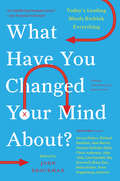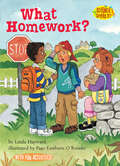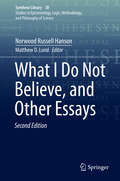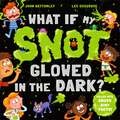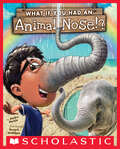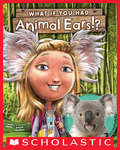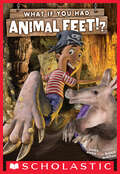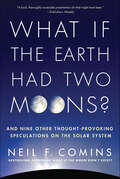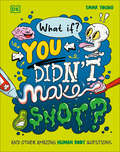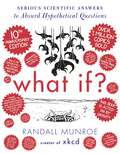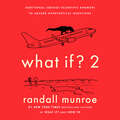- Table View
- List View
What Einstein Told His Barber: More Scientific Answers to Everyday Questions
by Robert L. WolkeWritten in a humorous style, this book addresses such questions as "what really keeps and airplane up?" and "why do wet things look darker?" Wolke (chemistry, U. of Pittsburgh) provides simple explanations to complex phenomena like gravity and acoustics, as well as simple experiments to do at home that prove his points. Annotation c. Book News, Inc. , Portland, OR (booknews. com)
What Every Engineer Should Know About Python (What Every Engineer Should Know)
by Raymond J. MadachyEngineers across all disciplines can benefit from learning Python. This powerful programming language enables engineers to enhance their skill sets and perform more sophisticated work in less time, whether in engineering analysis, system design and development, integration and testing, machine learning and other artificial intelligence applications, project management, or other areas. What Every Engineer Should Know About Python offers students and practicing engineers a straightforward and practical introduction to Python for technical programming and broader uses to enhance productivity. It focuses on the core features of Python most relevant to engineering tasks, avoids computer science jargon, and emphasizes writing useful software while effectively leveraging generative AI. Features examples tied to real-world engineering scenarios that are easily adapted Explains how to leverage the vast ecosystem of open-source Python packages for scientific applications, rather than developing new software from scratch Covers the incorporation of Python into engineering designs and systems, whether web-based, desktop, or embedded Provides guidance on optimizing generative AI with Python, including case study examples Describes software tool environments and development practices for the rapid creation of high-quality software Demonstrates how Python can improve personal and organizational productivity through workflow automation Directs readers to further resources for exploring advanced Python features This practical and concise book serves as a self-contained introduction for engineers and readers from scientific disciplines who are new to programming or to Python.
What Every Science Student Should Know (Chicago Guides to Academic Life)
by Justin L. Bauer Andrew H. Zureick Yoo Jung Kim Daniel K. Lee"I am often amazed at how much more capability and enthusiasm for science there is among elementary school youngsters than among college students. . . . We must understand and circumvent this dangerous discouragement. No one can predict where the future leaders of science will come from."--Carl Sagan In 2012, the White House put out a call to increase the number of STEM graduates by one million. Since then, hundreds of thousands of science students have started down the path toward a STEM career. Yet, of these budding scientists, more than half of all college students planning to study science or medicine leave the field during their academic careers. What Every Science Student Should Know is the perfect personal mentor for any aspiring scientist. Like an experienced lab partner or frank advisor, the book points out the pitfalls while providing encouragement. Chapters cover the entire college experience, including choosing a major, mastering study skills, doing scientific research, finding a job, and, most important, how to foster and keep a love of science. This guide is a distillation of the authors' own experiences as recent science graduates, bolstered by years of research and interviews with successful scientists and other science students. The authorial team includes former editors-in-chief of the prestigious Dartmouth Undergraduate Journal of Science. All have weathered the ups and downs of undergrad life--and all are still pursuing STEM careers. Forthright and empowering, What Every Science Student Should Know is brimming with insider advice on how to excel as both a student and a scientist.
What Evolution Is
by Ernst MayrMayr provides as convincing a testament to Darwin's genius as you are likely to find. --New York Times Book Review
What Evolution Is: From Theory to Fact
by Ernst MayrWhat we do and do not know about evolution, by one of the field's pioneering thinkers.Evolution is the most important idea in biology, with implications that go far beyond science. But despite more than a century's progress in understanding, there is still widespread confusion about what evolution is, how it works and why it is the only plausible mechanism that can account for the remarkable diversity of life on Earth.Now, for the first time in a book aimed at a general audience, one of the founding fathers of modern biology tells us what we know - and what we do not know - about evolution. In showing how evolution has gone from theory to fact, he explores various controversial fads and fallacies such as punctuated equilibrium, the selfish-gene theory and evolutionary psychology. He ends by looking at what we know about human evolution and how, in turn, this knowledge has affected the way in which we view ourselves and the world.
What Explains Similarities And Differences Between Organisms?: Student Activity Guide
by The Smithsonian InstitutionNIMAC-sourced textbook
What Fossils Tell Us: The History of Life (Come Learn With Me Series)
by Bridget AndersonThis book examines the ever-unfolding stories these fossils reveal about life on Earth. Dig in and learn how fossils were formed, and find out about some of the important people and places in the field of paleontology (the study of fossils and ancient life).
What Future: The Years Best Ideas To Reclaim, Reanimate & Rreinvent Our Future
by Roy Scranton Torie BoschAn anthology of writing that looks at the interplay between technology and our environment to imagine the future and feature the innovators creating the future.
What Galileo Saw: Imagining the Scientific Revolution
by Lawrence LipkingThe Scientific Revolution of the seventeenth century has often been called a decisive turning point in human history. It represents, for good or ill, the birth of modern science and modern ways of viewing the world. In What Galileo Saw, Lawrence Lipking offers a new perspective on how to understand what happened then, arguing that artistic imagination and creativity as much as rational thought played a critical role in creating new visions of science and in shaping stories about eye-opening discoveries in cosmology, natural history, engineering, and the life sciences. When Galileo saw the face of the Moon and the moons of Jupiter, Lipking writes, he had to picture a cosmos that could account for them. Kepler thought his geometry could open a window into the mind of God. Francis Bacon's natural history envisioned an order of things that would replace the illusions of language with solid evidence and transform notions of life and death. Descartes designed a hypothetical "Book of Nature" to explain how everything in the universe was constructed. Thomas Browne reconceived the boundaries of truth and error. Robert Hooke, like Leonardo, was both researcher and artist; his schemes illuminate the microscopic and the macrocosmic. And when Isaac Newton imagined nature as a coherent and comprehensive mathematical system, he redefined the goals of science and the meaning of genius. What Galileo Saw bridges the divide between science and art; it brings together Galileo and Milton, Bacon and Shakespeare. Lipking enters the minds and the workshops where the Scientific Revolution was fashioned, drawing on art, literature, and the history of science to reimagine how perceptions about the world and human life could change so drastically, and change forever.
What Happens at a Vet's Office (Where People Work Series)
by Amy HutchingsThis book describes in detail a visit to the vet’s clinic.
What Happens to a Hamburger?
by Paul Showers Edward Miller Anne F. RockwellWhat happens to food after you eat it? In this newly illustrated book, complete with photos, Paul Showers and Edward Miller take you on a journey through the human digestive system into the mouth, down the gullet, into the stomach, and finally into the small and large intestines. You will learn what each of these body parts does to help transform the food you eat. And you will also find out what happens to the food your body cannot use. Everything that happens inside your body whenever you swallow a bite of food will amaze you! Image descriptions present.
What Happens to a Hamburger? (Let's-Read-and-Find-Out Science 2)
by Paul ShowersRead and find out about your digestive system in this colorfully illustrated nonfiction picture book.What happens to food when you eat it? Read and find out about your digestive system and how it turns food into energy your body can use.This is a clear and appealing science book for early elementary age kids, both at home and in the classroom. It's a Level 2 Let's-Read-and-Find-Out, which means the book explores more challenging concepts for children in the primary grades. The 100+ titles in this leading nonfiction series are:hands-on and visualacclaimed and trustedgreat for classroomsTop 10 reasons to love LRFOs:Entertain and educate at the same timeHave appealing, child-centered topicsDevelopmentally appropriate for emerging readersFocused; answering questions instead of using survey approachEmploy engaging picture book quality illustrationsUse simple charts and graphics to improve visual literacy skillsFeature hands-on activities to engage young scientistsMeet national science education standardsWritten/illustrated by award-winning authors/illustrators & vetted by an expert in the fieldOver 130 titles in print, meeting a wide range of kids' scientific interestsBooks in this series support the Common Core Learning Standards, Next Generation Science Standards, and the Science, Technology, Engineering, and Math (STEM) standards. Let's-Read-and-Find-Out is the winner of the American Association for the Advancement of Science/Subaru Science Books & Films Prize for Outstanding Science Series.
What Have You Changed Your Mind About?
by Mr John BrockmanEven geniuses change their minds sometimes.Edge (www.edge.org), the influential online intellectual salon, recently asked 150 high-powered thinkers to discuss their most telling missteps and reconsiderations: What have you changed your mind about? The answers are brilliant, eye-opening, fascinating, sometimes shocking, and certain to kick-start countless passionate debates.Steven Pinker on the future of human evolution * Richard Dawkins on the mysteries of courtship * SAM HARRIS on the indifference of Mother Nature * Nassim Nicholas Taleb on the irrelevance of probability * Chris Anderson on the reality of global warming * Alan Alda on the existence of God * Ray Kurzweil on the possibility of extraterrestrial life * Brian Eno on what it means to be a "revolutionary" * Helen Fisher on love, fidelity, and the viability of marriage * Irene Pepperberg on learning from parrots . . . and many others.
What Have You Changed Your Mind About?
by Mr John BrockmanEven geniuses change their minds sometimes.Edge (www.edge.org), the influential online intellectual salon, recently asked 150 high-powered thinkers to discuss their most telling missteps and reconsiderations: What have you changed your mind about? The answers are brilliant, eye-opening, fascinating, sometimes shocking, and certain to kick-start countless passionate debates.Steven Pinker on the future of human evolution * Richard Dawkins on the mysteries of courtship * SAM HARRIS on the indifference of Mother Nature * Nassim Nicholas Taleb on the irrelevance of probability * Chris Anderson on the reality of global warming * Alan Alda on the existence of God * Ray Kurzweil on the possibility of extraterrestrial life * Brian Eno on what it means to be a "revolutionary" * Helen Fisher on love, fidelity, and the viability of marriage * Irene Pepperberg on learning from parrots . . . and many others.
What Have You Changed Your Mind About? Today's Leading Minds Rethink Everything
by John BrockmanEven geniuses change their minds sometimes. Edge (www.edge.org), the influential online intellectual salon, recently asked 150 high-powered thinkers to discuss their most telling missteps and reconsiderations: What have you changed your mind about? The answers were brilliant, eye-opening, fascinating, sometimes shocking, and certain to kick-start countless passionate debates. Read Steven Pinker on the future of human evolution; Richard Dawkins on the mysteries of courtship; Sam Harris on the indifference of Mother Nature ; Nassim Nicholas Taleb on the irrelevance of probability; Chris Anderson on the reality of global warming; Alan Alda on the existence of God; Lisa Randall on the secrets of the Sun; Ray Kurzweil on the possibility of extraterrestrial life; Brian Eno on what it means to be a "revolutionary"; Helen Fisher on love, fidelity, and the viability of marriage; Irene Pepperberg on learning from parrots... and many others.
What Homework? (Science Solves It!)
by Linda HaywardAndy forgot to do his homework. He only has a few minutes to find out what he needs to complete the project.
What I Do Not Believe, and Other Essays (Synthese Library #38)
by Norwood Russell HansonFifty years have passed since Norwood Russell Hanson's unexpected death, yet he remains an important voice in philosophy of science. This book is a revised and expanded edition of a collection of Hanson's essays originally published in 1971, edited by Stephen Toulmin and Harry Woolf. The new volume features a comprehensive introduction by Matthew Lund (Rowan University) and two new essays. The first is "Observation and Explanation: A Guide to Philosophy of Science", originally published as a posthumous book by Harper and Row. This essay, written near the end of Hanson’s life, represents his mature philosophy of science. The second new addition, Hanson's essay "The Trial of Galileo", is something of a "lost" work – it was only published in a small run collection on famous trials and was left out of the published lists of Hanson’s works. Ever the outspoken firebrand, Hanson found many lessons and warnings from Galileo's trial that were relevant to Cold War America.This volume not only contains Hanson's best-known work in history and philosophy of science, but also highlights the breadth of his philosophical thought. Hanson balanced extreme versatility with a unified approach to conceptual and philosophical problems. Hanson's central insight is that philosophy and science both strive to render the world intelligible -- the various concepts central to our attempts to make sense of the world are interdependent, and cannot operate, or even be fully understood, independently. The essays included in this collection present Hanson's thinking on religious belief, theory, observation, meaning, cosmology, modality, logic, and philosophy of mind. This collection also includes Hanson's lectures on the theory of flight, Hanson's greatest passion.
What If My Snot Glowed in the Dark?
by John BottomleyEverybody pees, poos and pukes, and everyone has icky skin and smells horrible. But have you ever wondered what would happen if your burps could power a hot air balloon? You could burp your way across the country! Or what if your farts smelled like roses? Well, you could grow a fart garden, or start a range of perfumes inspired by your farts. Or what if you never, EVER showered again? (Please, do make sure you shower regularly!) With plenty hilarious, yucky facts to discover about the gross stuff that comes out of you, budding young scientists - and comedians! - can learn all about why their bodies do icky, sticky things. What if My Snot was Glow in the Dark? really puts the FUN in bodily functions.
What If You Had An Animal Nose? (What If You Had... ?)
by Sandra MarkleIf you could have any animal's nose, whose would you choose?What if you woke up one morning and your nose wasn't yours? What If You Had An Animal Nose?--the next imaginative book in the What If You Had series--explores what would happen if you looked in the mirror and saw an animal's nose instead of your own! From the elephant's long trunk to a rhino's pointy horn, discover what it would be like if you had these special noses--and find out why your nose is just the right one for you!
What If You Had Animal Ears? (What If You Had... ?)
by Sandra MarkleIf you could have any animal's ears, whose would you choose?What if you woke up one morning and your ears weren't yours? What If You Had Animal Ears explores what would happen if you looked in the mirror and saw an animal's ears instead of your own! The next imaginative book in the What If You Had series, explores incredible ears from the animal kingdom. From the elephant's tremendous ears to the jack rabbit's mood ears, discover what it would be like if you had these special ears--and find out why your ears are just the right ones for you!
What If You Had Animal Feet? (What If You Had... ?)
by Sandra MarkleIf you could have any animal's feet, whose would you choose?WHAT IF YOU HAD ANIMAL FEET? is the next book in the successful WHAT IF series by Sandra Markle, illustrated by Howard McWilliam, following the very popular WHAT IF YOU HAD ANIMAL TEETH? and WHAT YOU IF HAD ANIMAL HAIR? This latest edition will teach kids about the amazing variety of feet in the animal kingdom and their specialty functions! From cheetahs' fast feet to mountain goats' nimble climbing hooves, to flies' sticky feet! Each animal profile will include a photo as well as illustrations of kids with animal feet that are sure to make kids laugh!
What If the Earth Had Two Moons?: And Nine Other Thought-Provoking Speculations on the Solar System
by Neil F. Comins"What if?" questions stimulate people to think in new ways, to refresh old ideas, and to make new discoveries. In What If the Earth Had Two Moons, Neil Comins leads us on a fascinating ten-world journey as we explore what our planet would be like under alternative astronomical conditions. In each case, the Earth would be different, often in surprising ways. The title chapter, for example, gives us a second moon orbiting closer to Earth than the one we have now. The night sky is a lot brighter, but that won't last forever. Eventually the moons collide, with one extra-massive moon emerging after a period during which Earth sports a Saturn-like ring.This and nine and other speculative essays provide us with insights into the Earth as it exists today, while shedding new light on the burgeoning search for life on planets orbiting other stars. Appealing to adult and young adult alike, this book is a fascinating journey through physics and astronomy, and follows on the author's previous bestseller, What if the Moon Didn't Exist?, with completely new scenarios backed by the latest astronomical research.
What If... You Didn't Make Snot?: And Other Amazing Human Body Questions (What If?)
by Emma YoungFind out the answers to 33 crazy and laugh-out-loud questions with science author Emma Young.Prepare to learn all about the human body, from blood vessels to the brain and nerves to nutrients, in this engaging question-and-answer book. What If You Didn’t Make Snot? is not your usual science book. Children aged 7-9 will be drawn into each topic with one of 33 amusing questions that are guaranteed to make kids think about anatomy in a whole new way. Author Emma Young explains the answers with humor and plenty of science facts that kids will be racing to share with friends and family.This human body book for children offers:Fun and engaging content by science author Emma Young.33 laugh-out-loud questions with key science facts are woven into the answers.A mix of photography and cartoon-style illustrations that bring the questions to life.Curriculum-aligned and age-appropriate material about the human body for children.Children can dip in and out of bite-sized information on each page, filled with attention-grabbing photography and quirky illustrations. Even reluctant readers will find this human body book entertaining, as they find out the answers to the wacky, bizarre, and gross questions.
What If? 10th Anniversary Edition: Serious Scientific Answers to Absurd Hypothetical Questions
by Randall MunroeCELEBRATING TEN YEARS OF THE MILLION-SELLING POP SCIENCE CLASSIC WITH A SPECIAL EDITION. THIS IS WHAT IF? . . . x10.THE SUNDAY TIMES BESTSELLER'Nerd royalty' BEN GOLDACRE 'Totally brilliant' TIM HARFORD'Required reading across the world' NEW YORK TIMESFrom the creator of the wildly popular xkcd.com, hilarious and informative answers to important questions you probably never thought to ask.Fans of Randall Munroe ask him a lot of strange questions: How fast can you hit a speed bump, driving, and live? When (if ever) did the sun go down on the British Empire? When will Facebook contain more profiles of dead people than living? How many humans would a T Rex rampaging through New York need to eat a day? In pursuit of answers, Munroe runs computer simulations, pores over stacks of declassified military research memos, solves differential equations and consults nuclear reactor operators. His responses are masterpieces of clarity and hilarity, complemented by comics. (They often predict the complete annihilation of humankind, or at least a really big explosion.)In celebration of 10 years of unusual insight, Randall Munroe has revised his classic blockbuster to ask what if? x 10. Featuring brand-new 2-colour annotations and illustrations, this special anniversary edition will leave you feeling much smarter, whether you have a Nobel Prize or not.
What If?2: Additional Serious Scientific Answers to Absurd Hypothetical Questions
by Randall MunroeWHAT IF... one man decided to answer all the unanswerable questions, using science.The Sunday Times-bestselling author and xkcd creator, Randall Munroe is here to provide the best answers yet to the important questions you probably never thought to askThe millions of people around the world who read and loved What If? still have questions, and those questions are getting stranger.Planning to ride a fire pole from the moon back to Earth? The hardest part is sticking the landing.Hoping to cool the atmosphere by opening everyone's freezer doors at the same time? Maybe it's time for a brief introduction to thermodynamics.Want to know what would happen if you rode a helicopter blade, built a billion-storey building, made a lava lamp out of lava, or jumped on a geyser as it erupted? Okay, if you insist.Welcome (back) to the mind-blowing world of What If?Unfazed by absurdity, Randall consults the latest research on everything from swing-set physics to airplane-catapult design to clearly and concisely answer his readers' questions. As he consistently demonstrates, you can learn a lot from examining how the world might work in very specific extreme circumstances.Filled with bonkers science, boundless curiosity, and Randall's signature stick-figure comics, What If? 2 is sure to be another instant classic adored by inquisitive readers of all ages.(P)2022 Penguin Random House Audio
